Guzman arrest: A coup for Mexican President Pena Nieto?
- Published
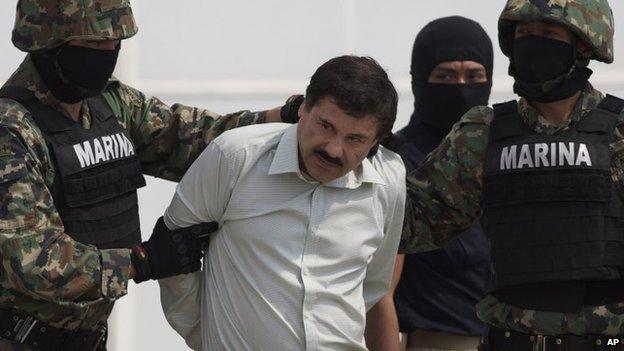
Joaquin Guzman was paraded in front of the media before being taken to a high-security jail in Mexico state
The capture by Mexican marines of drug lord Joaquin "Shorty" Guzman has been lauded as "an impeccable operation". The BBC's Mexico correspondent Will Grant looks at the significance of his arrest for the country's president, Enrique Pena Nieto.
It is hard to overstate just how important a scalp Guzman is for President Pena Nieto.
The world's most wanted drug trafficker - perhaps the world's most wanted man - had evaded the joint efforts of the Mexican and US security forces to apprehend him for 13 years.
Not since January 2001, when he walked out of the front door of Puente Grande maximum-security prison - or escaped in a laundry basket if popular myth is to be believed - has Joaquin Guzman seen the inside of a jail or courtroom.
Instead, he has been able to control his vast criminal organisation, the Sinaloa Cartel, with total impunity from his north-western stomping ground, where he was well protected by a network of corrupt police forces, political contacts and loyal communities.
'Let his guard down'
Of course he has also used ruthless violence to keep control of the lucrative drug routes through which he smuggled thousands of tonnes of cocaine into the United States.
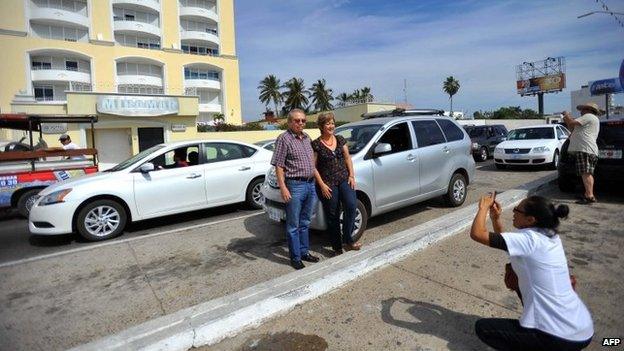
Guzman was captured in an apartment block in Mazatlan, guarded by only one man
Former Mexican President Felipe Calderon congratulated his successor via Twitter for having taken down Guzman, better known as "El Chapo" (Shorty).
But underneath his tweet was a raft of comments - some more abusive than others - all asking the same question: how is it that President Pena Nieto found Guzman within a year when ex-President Calderon could not find him in his six years in power?
"If we believe the official version of events, it was because 'El Chapo' let his guard down," says Alberto Najar, BBC Mundo's expert on the Mexican drug war.
"He went to an area he had visited many times before with relative safety, but this time something failed in his intelligence structures."
At the time of his arrest, Guzman was guarded by just one man rather than a large security team.
That "El Chapo" had began to trust in his own safety in Mazatlan - perhaps had even began to cut corners - may have presented the elite unit which was after him with the window of opportunity it needed.
Mr Najar also does not rule out that one of Guzman's men may have turned him in.
"By attracting the attention of the authorities, he was perhaps worth more to the cartel in prison or dead than he was alive and on the run," he explains.
New approach?
During the 2012 presidential campaign, members of Mr Pena Nieto's inner circle made it clear that they intended to change tack against the cartels once in government.
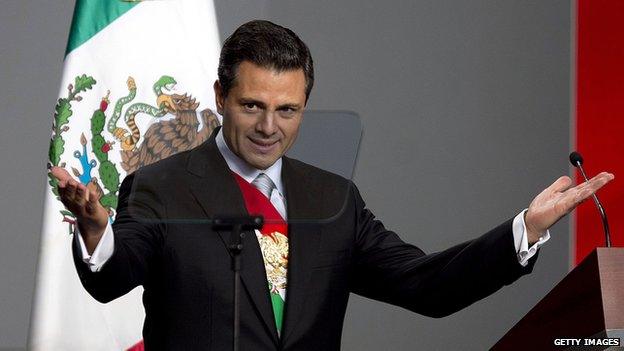
Enrique Pena Nieto promised to take a different approach to the war on drugs in Mexico
Instead of focusing on powerful individuals such as "El Chapo", the administration would aim to reduce violent crime across the board.
"There is always another kingpin to replace the last", a senior official told the BBC.
Therefore there was little point in continuing Mr Calderon's much-maligned policy of chasing down the big players using military force, the official said.
Yet more than a year later, apart from some localised improvements, little headway has been made in lowering the rates of murder, extortion and kidnapping.
At the same time, several elusive drug lords have been caught, including the head of the Zetas cartel, Miguel Angel Trevino, known as "Z-40", and Gulf cartel leader Mario Cardenas Guillen.
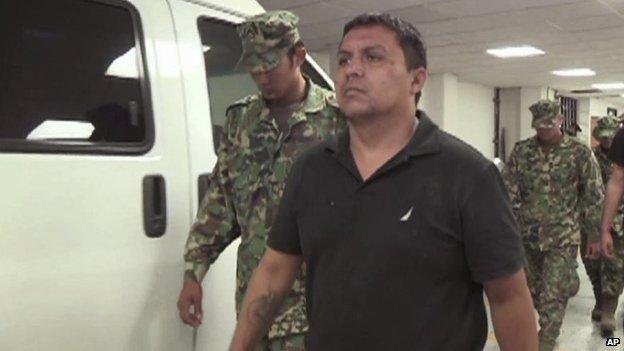
The arrest of the leader of the Zetas cartel, known as Z-40, was an important achievement for the government
So was the plan to keep chasing the big fish all along?
"For me it is a demonstration of the federal government's lack of a coherent strategy on organised crime," says Anabel Hernandez, author of Narcoland: The Mexican Drug Lords and their Godfathers.
"Chapo's arrest primarily came around because of pressure by the DEA [US Drug Enforcement Administration] and from Washington."
While the arrest makes for good headlines, she argues, a clear strategy against the Sinaloa Cartel would now involve several further steps such as freezing the cartel's assets and detaining the police officers and politicians who protected Guzman for years.
Crucially, Anabel Hernandez says, removing Guzman does little to weaken the Sinaloa Cartel in the long term with his number two, Ismael "El Mayo" Zambada, ready to take over the reins of power.
Daunting challenges
Arresting "El Chapo" is undoubtedly a massive shot in the arm for the Pena Nieto administration, but the challenges it still faces are daunting.
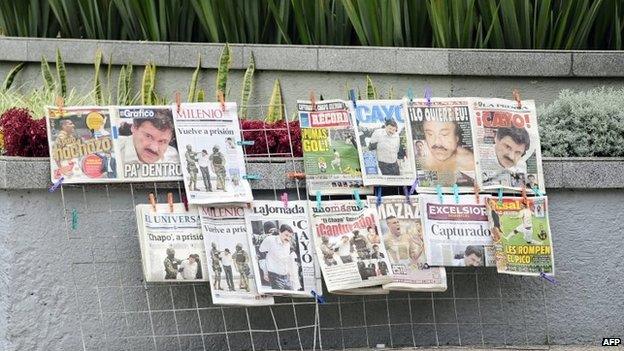
Mexican newspapers gave Guzman's capture ample coverage on their front pages
Newer criminal organisations, such as the Nueva Generacion Cartel in the state of Jalisco, are growing in strength, particularly in the methamphetamine trade.
In neighbouring Michoacan state, the heavily armed vigilantes fighting the Knights Templar cartel had to be brought under the umbrella of the federal security forces to lend them a degree of legitimacy.
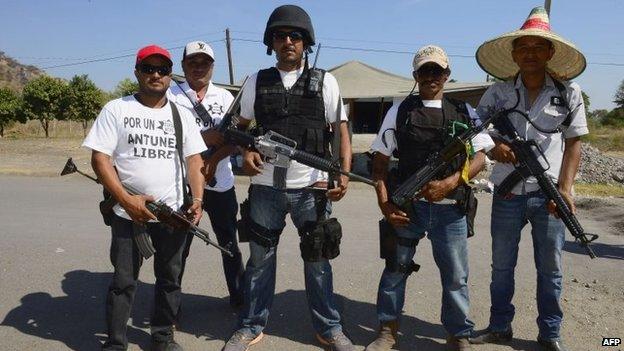
Vigilante groups have sprung up in the states of Michoacan and Guerrero
Many fear they will now prove hard to rein back in.
On the day that Guzman was arrested, unidentified armed men reportedly killed 20 people, including women and children, in the small village of Linda Vista in Guerrero state.
The exact motivation for the attack is unclear but there are reports that the villagers were forming their own "self-defence unit" and a local criminal gang decided to leave a brutal and uncompromising message.
While the Pena Nieto administration is understandably pleased to have "El Chapo" back behind bars, it seems officials still have a long way to go in addressing the underlying issues behind the violence.
- Published22 February 2014
- Published10 February 2014